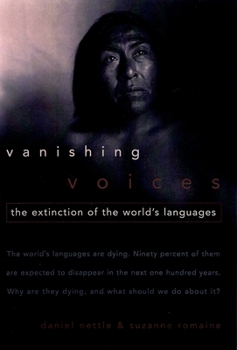Vanishing Voices: The Extinction of the World's Languages
Select Format
Select Condition 
Book Overview
Few people know that nearly one hundred native languages once spoken in what is now California are near extinction, or that most of Australia's 250 aboriginal languages have vanished. In fact, at least half of the world's languages may die out in the next century.
Daniel Nettle and Suzanne Romaine assert that this trend is far more than simply disturbing. Making explicit the link between language survival and environmental issues, they argue that the extinction of languages is part of the larger picture of near-total collapse of the worldwide ecosystem. Indeed, the authors contend that the struggle to preserve precious environmental resources-such as the rainforest-cannot be separated from the struggle to maintain diverse cultures, and that the causes of language death, like that of ecological destruction, lie at the intersection of ecology and politics.
In addition to defending the world's endangered languages, the authors also pay homage to the last speakers of dying tongues, such as Red Thundercloud, a Native American in South Carolina; Ned Mandrell, with whom the Manx language passed away in 1974; and Arthur Bennett, an Australian who was the last person to know more than a few words of Mbabaram.
In our languages lies the accumulated knowledge of humanity. Indeed, each language is a unique window on experience. Vanishing Voices is a call to preserve this resource, before it is too late.
Daniel Nettle and Suzanne Romaine assert that this trend is far more than simply disturbing. Making explicit the link between language survival and environmental issues, they argue that the extinction of languages is part of the larger picture of near-total collapse of the worldwide ecosystem. Indeed, the authors contend that the struggle to preserve precious environmental resources-such as the rainforest-cannot be separated from the struggle to maintain diverse cultures, and that the causes of language death, like that of ecological destruction, lie at the intersection of ecology and politics.
In addition to defending the world's endangered languages, the authors also pay homage to the last speakers of dying tongues, such as Red Thundercloud, a Native American in South Carolina; Ned Mandrell, with whom the Manx language passed away in 1974; and Arthur Bennett, an Australian who was the last person to know more than a few words of Mbabaram.
In our languages lies the accumulated knowledge of humanity. Indeed, each language is a unique window on experience. Vanishing Voices is a call to preserve this resource, before it is too late.
Format:Paperback
Language:English
ISBN:0195152468
ISBN13:9780195152463
Release Date:May 2002
Publisher:Oxford University Press
Length:256 Pages
Weight:0.86 lbs.
Dimensions:0.7" x 6.1" x 9.2"
Customer Reviews
4 ratings
For information and practice alike
Published by Thriftbooks.com User , 17 years ago
Its broad perspective of the various aspects related to linguistic extinction make the book a good introduction to the phenomenon. It is presented from the point of view of linguistics, anthropology, ecology, politics and - the practical aspect - activism alike, showing their interdepency. As other reviewers observed, the argument would gain if it would be more focused, less repetitive. Also the crucial chapter 1.3 "Why worry about languages dying?" evades answers. We are enlighted further on, in the well written chapter on what a linguistic equilibrium could look like, exemplified by the example of New Guinea. Another highlight of the book is the big historical canvas painted on the impact of agriculture and industrialization on languages - the author's theories of "biolinguistic ecosystem" and "language as natural resource".
Important but repetetive message
Published by Thriftbooks.com User , 23 years ago
There is little for me to add to the other fine reader reviews of this work except to say that I found it very repetitive. I am not sure that it could not have been a long article in the Atlantic or Harper's.I am not at all sure that there is much that can be done to preserve some of these minor languages in the long run but I do find it admirable that the authors have taken up the cudgel.
Vanishing voices
Published by Thriftbooks.com User , 24 years ago
This is a serious and important book about the rapid loss of language diversity in the world and what can be done about it. It also explains the ecology of how language diversity occurs and why it is important. Not too technical to be easy to read but also has much more information than I expected.
Reviews and Comments
Published by Thriftbooks.com User , 24 years ago
"[Vanishing Voices is] a superb study of endangered languages.. the tapestry of supporting detail is every bit as compelling as the central thesis" - The New Yorker"Language extinction is a great tragedy for human culture and for scholarship on all things human. This fascinating book is the latest word on this important issue, containing a wealth of knowledge and wisdom. If we have the good sense to rescue the priceless legacy of linguistic diversity before it vanishes forever, Vanishing Voices will surely deserve a good part of the credit." - Steven Pinker, author of "The Language Instinct" and "Words and Rules""Vanishing Voices is an urgent call to arms about the impending loss of one of our great resources. Nettle and Romaine paint a breathtaking landscape that shows why so many of the world's languages are disappearing and more importantly, why it matters. They put the problem of linguistic diversity into the wider context of global biodiversity, and propose the revolutionary idea that saving endangered languages is not about dictionaries and educational programs, but about preserving the cultures and habitats of the people who speak them. Along the way it's also a fascinating introduction to how language works: how languages are born, how they die, and how we can prevent their death." - Deborah Tannen, Georgetown University






